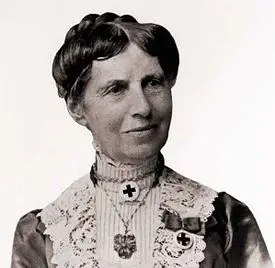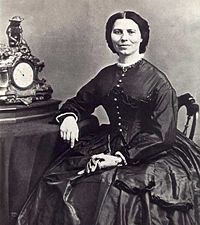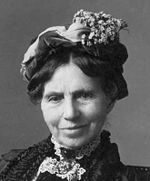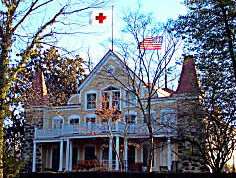Clara Barton
Clarissa Harlowe Barton (better known as Clara Barton) (December 25, 1821 –April 12, 1912) is best known for founding the American Red Cross. She was a teacher and humanitarian. She has been described as having had an "indomitable spirit".
Youth and education
Barton, the fifth and youngest child of Sarah Stone and Stephen Barton, was born on Christmas Day, 1821, in Oxford, Massachusetts, a small farming community. Her father was prominent in the local Universalist church and a former British Loyalist in the Revolutionary War. Her father's stories about his war experience in the army of General "Mad" Anthony Wayne led to her later interest in military matters. Her father was a farmer and horse breeder while her mother managed the household. The two later helped found the first Universalist Church in Oxford.
As a child, she was shy and retiring. All her brothers and sisters were at least ten years older. Young Clara was home-educated and extremely bright. She spent brief periods in public school settings but most of her education came from her two brothers and two sisters. By the time she was four years old, Clara could easily spell complicated words.
When Clara was six her older sister Dolly, had a mental breakdown. Dolly apparently broke down under the stress of taking care of their emotionally unbalanced mother. Thereafter, sister Sally looked out for Clara while Dolly remained locked in an upstairs room. Clara learned early to make the best of a difficult family situation, Later, at the age of 11, a fall at a construction site rendered her brother David an invalid. Clara stayed by his side for two years and learned to administer all his medicine, including the "great, loathsome crawling leeches."
Teaching and Mission
Clara was 15 when L. N. Fowler, a noted phrenologist, advised Barton's parents to have her teach school. In 1839 she passed an examination and began a 10 year teaching career in district schools near Oxford, Massachusetts. When the school where she taught won a prize for discipline many job offers followed, even after she demanded and received the same pay as male teachers.
In 1854, suffering from overwork, she took a break from teaching and attended the Clinton Liberal Institute in Clinton, New York, where she studied analytic geometry, calculus, astronomy, mathematics and natural science in addition to French, German, ancient history, philosophy and religion. When the term ended, schoolmates Charles and Mary Norton invited her for an extended visit with their family in Hightstown, New Jersey. Soon she was teaching in the Cedarville school and later in Bordentown.
It was in New Jersey that she started the state's first free public school. The school was so successful that a new building was constructed and additional teachers hired. When a man was brought in to head the school at a salary that was $250 more than hers she resigned.
Shen then moved to Washington, D.C. where she became the first woman clerk in the Patent Office, for a salary equal to the men's.
When her father was dying, he gave Clara advice that she would always recall:
- "As a patriot, he had me serve my country with all I had, even with my life if need be; as the daughter of an accepted Mason, he had me seek and comfort the afflicted everywhere, and as a Christian he charged me to honor God and love mankind."
American Civil War
When the American Civil War began, Barton resigned her position in the Patent Office to devote herself to the care of wounded soldiers on the field of battle. With the outbreak of war and the cascade of wounded Union soldiers into Washington, she quickly recognized the unpreparedness of the Army Medical Department. In April 1861, after the First Battle of Bull Run, she established an agency to obtain and distribute supplies to wounded soldiers. For nearly a year, she lobbied the U.S. Army bureaucracy in vain to bring her own medical supplies to the battlefields. Finally, in July 1862, she obtained permission to travel behind the lines, eventually reaching some of the grimmest battlefields of the war and serving during the sieges of Petersburg, Virginia and Richmond, Virginia. Barton delivered aid to soldiers of both the North and South, working close to the battlefield. In 1864 she was appointed by Union General Benjamin Butler "lady in charge" of the hospitals at the front of the Army of the James.
In 1865, President Abraham Lincoln placed her in charge of the search for the missing men of the Union army, and while engaged in this work she traced the fate of 30,000 men. As the war ended, she was sent to Andersonville, Georgia, to identify and mark the graves of Union soldiers buried there. This experience launched her on a nationwide campaign to identify soldiers missing during the Civil War. She published lists of names in newspapers and exchanged letters with veterans and soldiers' families. She also delivered lectures on her war experiences, which were well received. She met Susan B. Anthony and began a long association with the suffrage movement. She also became acquainted with Frederick Douglass and became an activist for black civil rights.
Barton sees the International Red Cross in action
The search for missing soldiers and years of toil during the Civil War physically debilitated Miss Barton. In 1869, her doctors recommended a restful trip to Europe. In 1870, while she was overseas (on "vacation"), she became involved with the International Red Cross and its humanitarian work during the war between France and Prussia. Created in 1864, the International Red Cross had been chartered to provide humane services to all victims during wartime under a flag of neutrality.
Organizing the American Red Cross
When she returned to the United States, she inaugurated a movement to secure recognition of the International Red Cross society by the United States government. When she began this organizing work in 1873, no one thought the U.S. would ever again face an experience like the Civil War, but she finally succeeded during the administration of President James Garfield on the basis that the new American Red Cross organization could also be available to respond to other types of crisis. As Barton expanded the original concept of the Red Cross to include assisting in any great national disaster, this service brought the United States the "Good Samaritan of Nations" label. Barton naturally became President of the American branch of the society, which was founded on May 21, 1881. John D. Rockefeller gave money to create a national headquarters in Washington, DC, located one block from the White House.
Religious Beliefs
Clara Bartona,called a“Deist-Unitarian.” Her actual beliefs varied throughout her life across a spectrum between freethought and deism. In a 1905 letter to her friend, Norman Thrasher, she called herself a “Universalist.” [1]
By all counts, due to her relationship with her father, she held fast to the belief, that the ultimate purpose of her life was to live in service to others, which she did, with great furvor,t hroughout life.
Later life, heritage
Clara Barton continued to do relief work on the battle field as an aid until well into her 70s. She went to Cuba with a cargo of supplies in 1898 and spent six weeks on the scene of the Galveston, Texas floods, at age 79. She resigned from the American Red Cross in 1904 at the age of 83 and spent her remaining years in Glen Echo, Maryland. She died in 1912 at age 90, and is buried less than a mile from her birthplace in a family plot in Oxford, Massachusetts.
One published source sums her life up this way:
- Clara Barton was one of America's greatest heroines — a true patriot and philanthropist who, when she saw a practical need, gave every ounce of her strength to address it. [2]
The American Red Cross she founded is one of the largest humanitarian organizations in the world. Barton was the most decorated American woman, receiving the Iron Cross, the Cross of Imperial Russia, and the International Red Cross Medal. Her final act was founding the National First Aid Society in 1904.
In 1942, a United States Liberty ship named the SS Clara Barton was launched.
Clara Barton's Birthplace House and Museum
Clara Barton's Birthplace in North Oxford, Massachusetts [3] is operated as a house museum as part of the Barton Center for Diabetes Education [4], a humanitarian project established in her honor to educate and support children with diabetes and their families.
Clara Barton National Historic Site
In 1975, Clara Barton National Historic Site was established as a unit of the National Park Service at her Glen Echo, Maryland home. The first National Historic Site dedicated to the accomplishments of a woman, it preserves the early history of the American Red Cross and the last home of its founder. Clara Barton spent the last 15 years of her life in her Glen Echo home, and it served as an early headquarters of the American Red Cross as well.
The National Park Service has restored eleven rooms, including the Red Cross offices, parlors and Miss Barton's bedroom. Visitors to Clara Barton National Historic Site can gain a sense of how Miss Barton lived and worked surrounded by all that went into her life's work. Visitors to the site are led through the three levels on a guided tour emphasizing Miss Barton's use of her unusual home, and come to appreciate the site in the same way visitors did in Clara Barton's lifetime. [5]
Quotes
"I have an almost complete disregard of precedent, and a faith in the possibility of something better. It irritates me to be told how things have always been done. I defy the tyranny of precedent. I go for anything new that might improve the past."
" The door that nobody else will go in at,
seems always to swing open widely for me."
"I may be compelled to face danger, but
never fear it, and while our soldiers
can stand and fight, I can stand and feed
and nurse them."
"An institution or reform movement that is not selfish,must originate in the recognition of some evil that is adding to the sum of human suffering, or diminishing the sum of happiness."
"The surest test of discipline is its absence."
References Additional reading
- Barton, William E. The Life of Clara Barton Founder of the American Red Cross New York: AMS Press, (1969)
- Hutchinson, John F. Champions of Charity: War and the Rise of the Red Cross Boulder: Westview Press, Inc., (1996)
- Joyce, James Avery. Red Cross International and the Strategy of Peace New York: Oceana Publications, Inc., (1959)
- Pryor, Elizabeth Brown. Clara Barton: Professional Angel Philadelphia: University of Pennsylvania Press, (1987)
- Ross, Ishbel. Angel of the Battlefield: The Life of Clara Barton New York: Harper and Brothers Publishers, (1956)
- Deady,Kathleen,W. "Clara Barton" Mankato:Capstone Press, (2003)
External links
- Harvard University Library Open Collections Program. Women Working, 1870-1930. Clara Barton (1821-1912). A full-text searchable online database with complete access to publications written by Clara Barton.
- Civil War Biographies
- Clara Barton National Historic Site
- Clara Barton Birthplace Museum
- Unitarian Universalist Biographies
- The Barton Center For Diabetes Education, Inc.
- Clara Barton Timeline
- Women in History
Credits
New World Encyclopedia writers and editors rewrote and completed the Wikipedia article in accordance with New World Encyclopedia standards. This article abides by terms of the Creative Commons CC-by-sa 3.0 License (CC-by-sa), which may be used and disseminated with proper attribution. Credit is due under the terms of this license that can reference both the New World Encyclopedia contributors and the selfless volunteer contributors of the Wikimedia Foundation. To cite this article click here for a list of acceptable citing formats.The history of earlier contributions by wikipedians is accessible to researchers here:
The history of this article since it was imported to New World Encyclopedia:
Note: Some restrictions may apply to use of individual images which are separately licensed.



